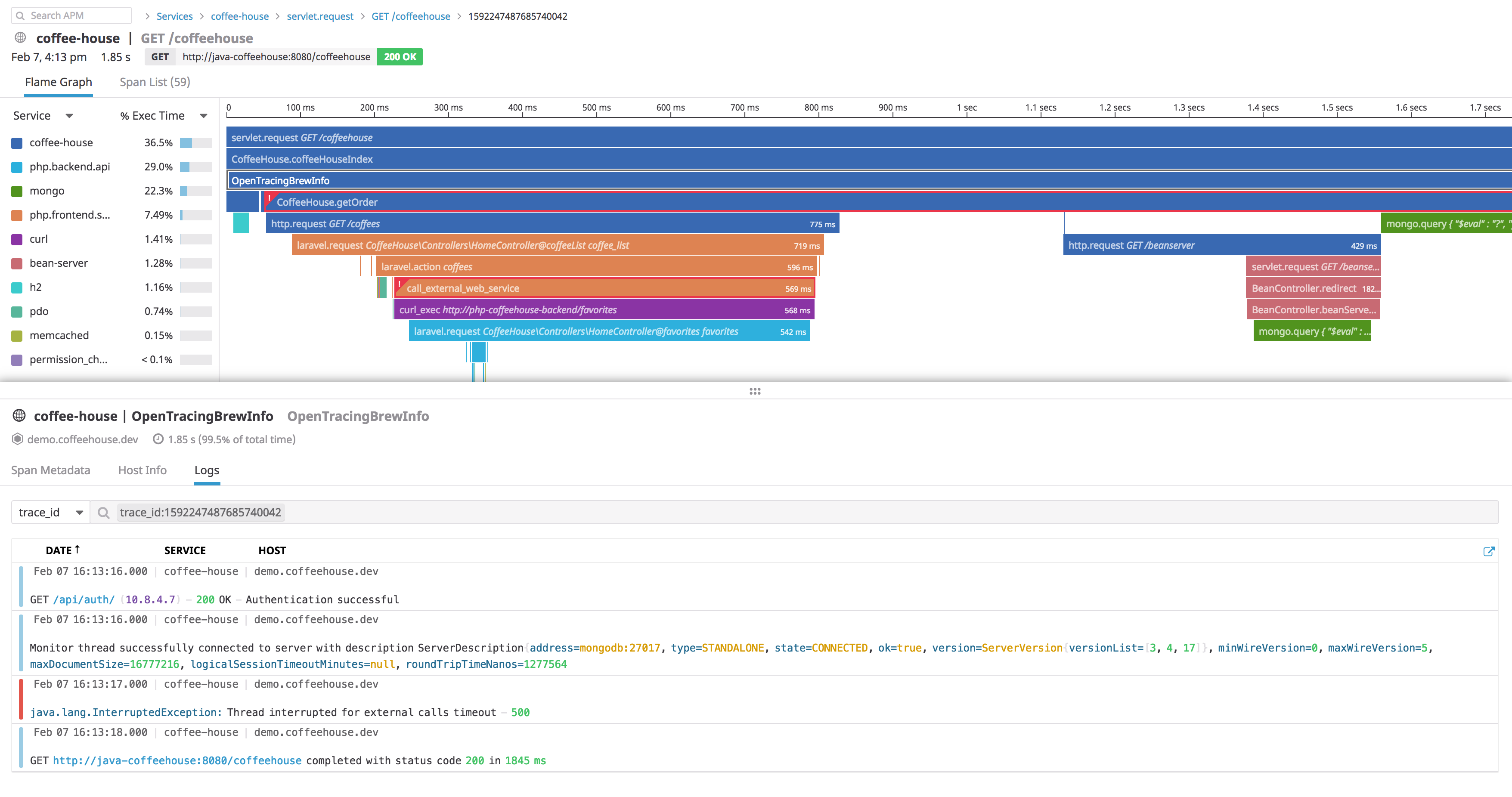OTel Me a Story
Observing code in production with OpenTelemetry (OTEL)

while True:
try:
x = int(input("Enter a number: "))
break
except ValueError:
print("Oops!")

Observability
Observability


Metrics, Logs and Traces




Metrics
Photo by Altered Vision on Unsplash
Metrics

Logs

Photo by Oliver Paaske on Unsplash
Logs
E0419 06:59:50.681167 1 reflector.go:138] pkg/mod/k8s.io/client-go@v0.22.4/tools/cache/reflector.go:167: Failed to watch *v1.Endpoints: the server has asked for the client to provide credentials (get endpoints)
time="2024-04-17T20:10:41Z" level=info msg="successfully synced configuration to kong." subsystem=proxy-cache-resolver
Logs

Logs
Logs
Traces

Traces
get '/posts' do
Datadog::Tracing.trace('web.request', service: 'my-blog', resource: 'GET /posts') do |span|
# Trace the activerecord call
Datadog::Tracing.trace('posts.fetch') do
@posts = Posts.order(created_at: :desc).limit(10)
end
# Add some APM tags
span.set_tag('http.method', request.request_method)
span.set_tag('posts.count', @posts.length)
# Trace the template rendering
Datadog::Tracing.trace('template.render') do
erb :index
end
end
endTraces

Traces


Traces

1.
2.
OTel captures traces, metrics, logs, and other application telemetry data and lets you send it to the backend of your choice.
OpenTelemetry (OTEL)

OTel ≈ Observability api + spec

OTel me, code, why are you slow?
// main.go
func main() {
http.HandleFunc("/rolldice", rolldice)
log.Fatal(http.ListenAndServe(":8000", nil))
}// rolldice.go
func rolldice(w http.ResponseWriter, r *http.Request) {
roll := 1 + rand.Intn(6)
// Sleep for a few seconds, so we can see longer traces
// And breakout the slow api call versus other work
// that might be done in this function, i.e. a DB query
time.Sleep(time.Millisecond * time.Duration(roll*100))
log.Println("simulating a call to slow api")
err := simulateSlowAPI(500 * roll)
if err != nil {
log.Printf("Failed to make call to simulate slow api")
}
resp := strconv.Itoa(roll) + "\n"
if _, err := io.WriteString(w, resp); err != nil {
log.Printf("Write failed: %v\n", err)
}
}// rolldice.go
// A function for simulating slowness with an external http call
func simulateSlowAPI(sleepInMilliseconds int) error {
// Construct the URL with the sleep parameter
baseURL := "https://fakeresponder.com/"
sleepParam := "?sleep=" + strconv.Itoa(sleepInMilliseconds)
// Create the full URL
fullURL := baseURL + sleepParam
// Make the GET request
resp, err := http.Get(fullURL)
if err != nil {
log.Println("Error making the GET request:", err)
return err
}
// > go run .
2024/04/24 22:03:11 simulating a call to slow api
2024/04/24 22:03:16 simulating a call to slow api
2024/04/24 22:03:20 simulating a call to slow api
2024/04/24 22:03:23 simulating a call to slow api
// > watch -n 2 'curl -s localhost:8000/rolldice
Every 2.0s: curl -s localhost:8000/rolldice
4## TODO: find out what's slow
_Assuming we didn't already know_ :)
- [ ] Add more logs
- [ ] Add metrics (response time, number of calls, etc)
*OR*
- [x] Add OTel// main.go
import "go.opentelemetry.io/contrib/instrumentation/net/http/otelhttp"
// Set up OpenTelemetry.
otelShutdown, err := setupOTelSDK(ctx)
if err != nil {
return
}
// Handle shutdown properly so nothing leaks.
defer func() {
err = errors.Join(err, otelShutdown(context.Background()))
}()
...
handleFunc := func(pattern string, handlerFunc func(http.ResponseWriter, *http.Request)) {
// Configure the "http.route" for the HTTP instrumentation.
handler := otelhttp.WithRouteTag(pattern, http.HandlerFunc(handlerFunc))
mux.Handle(pattern, handler)
handler := otelhttp.NewHandler(mux, "/")
// otel.go
func setupOTelSDK(ctx context.Context) (shutdown func(context.Context) error, err error) {
// Set up trace provider.
tracerProvider, err := newTraceProvider()
if err != nil {
handleErr(err)
return
}
shutdownFuncs = append(shutdownFuncs, tracerProvider.Shutdown)
otel.SetTracerProvider(tracerProvider)
case "stdout":
exporter, err = stdouttrace.New(
stdouttrace.WithPrettyPrint()
)
// rolldice.go
var (
tracer = otel.Tracer("rolldice")
meter = otel.Meter("rolldice")
rollCnt metric.Int64Counter
)
func rolldice(w http.ResponseWriter, r *http.Request) {
ctx, span := tracer.Start(r.Context(), "rolling dice")
defer span.End()
roll := 1 + rand.Intn(6)
// Sleep for a few seconds, so we can see longer traces
time.Sleep(time.Millisecond * time.Duration(roll*100))
span.AddEvent("simulating a call to slow api")
err := simulateSlowAPI(500*roll, ctx)
if err != nil {
log.Printf("Failed to make call to simulate slow api")
}// rolldice.go
func simulateSlowAPI(sleepInMilliseconds int, ctx context.Context) error {
ctx, childSpan := tracer.Start(ctx, "simulatedSlowApiSpan")
defer childSpan.End()
// Construct the URL with the sleep parameter
baseURL := "https://fakeresponder.com/"
sleepParam := "?sleep=" + strconv.Itoa(sleepInMilliseconds)(base) ➜ otel-dice-example git:(otel-with-stdout) ✗ go run .
{"Resource":[
{"Key":"service.name","Value":
{"Type":"STRING","Value":"dice"}
},
{"Key":"service.version","Value":
{"Type":"STRING","Value":"0.1.0"}
},
{"Key":"telemetry.sdk.language","Value":
{"Type":"STRING","Value":"go"}
},
{"Key":"telemetry.sdk.name","Value":
{"Type":"STRING","Value":"opentelemetry"}
},
{"Key":"telemetry.sdk.version","Value":
{"Type":"STRING","Value":"1.25.0"}
}
],"ScopeMetrics":[]}
{"Resource":[{"Key":"service.name","Value":{"Type":"STRING","Value":"dice"}},{"Key":"service.version","Value":{"Type":"STRING","Value":"0.1.0"}},{"Key":"telemetry.sdk.language","Value":{"Type":"STRING","Value":"go"}},{"Key":"telemetry.sdk.name","Value":{"Type":"STRING","Value":"opentelemetry"}},{"Key":"telemetry.sdk.version","Value":{"Type":"STRING","Value":"1.25.0"}}],"ScopeMetrics":[]}{
"Name": "/",
"SpanContext": {
"TraceID": "5a844fd338c4c00ec001fb28ea352c64",
"SpanID": "4908426582a52298",
},
"Parent": {
"TraceID": "00000000000000000000000000000000",
"SpanID": "0000000000000000",
},
"SpanKind": 2,
"StartTime": "2024-04-25T00:21:00.179788-06:00",
"EndTime": "2024-04-25T00:21:01.471713625-06:00",
"Attributes": [
{
"Key": "http.route",
"Value": {
"Type": "STRING",
"Value": "/rolldice"
}
},
{
"Name": "rolling dice",
"SpanContext": {
"TraceID": "5a844fd338c4c00ec001fb28ea352c64",
"SpanID": "7e394450317027c5",
},
"Parent": {
"TraceID": "5a844fd338c4c00ec001fb28ea352c64",
"SpanID": "4908426582a52298",
},
"Attributes": [
{
"Key": "roll.value",
"Value": {
"Type": "INT64",
"Value": 2
}
}
],🎲

> docker run -d --name jaeger \
-e COLLECTOR_OTLP_ENABLED=true \
-p 16686:16686 \
-p 4317:4317 \
-p 4318:4318 \
jaegertracing/all-in-one:latest
> OTEL_EXPORTER_OTLP_ENDPOINT=http://localhost:4318 go run .// otel.go
func createOtelExporter(exporterType string) (trace.SpanExporter, error) {
case "otlp":
var opts []otlptracehttp.Option
exporter, err = otlptrace.New(
context.Background(),
otlptracehttp.NewClient(opts...),
)
case "stdout":
exporter, err = stdouttrace.New(stdouttrace.WithPrettyPrint())



OTel your future self

Win a print copy of Observability Engineering

Observability
Thank you!
@virtualandy
Photo by Frederick Marschall on Unsplash
OTel Me a Story: Observing Code in Production
By virtualandy
OTel Me a Story: Observing Code in Production
You shipped your code and someone says it’s busted. How can it be?! Observability is a super power to help you diagnose your systems. OpenTelemetry - or OTEL - is a set of APIs, SDKs and specs for observability. We’ll briefly cover Observability and how to get started so you can analyze and improve your software.
- 451







